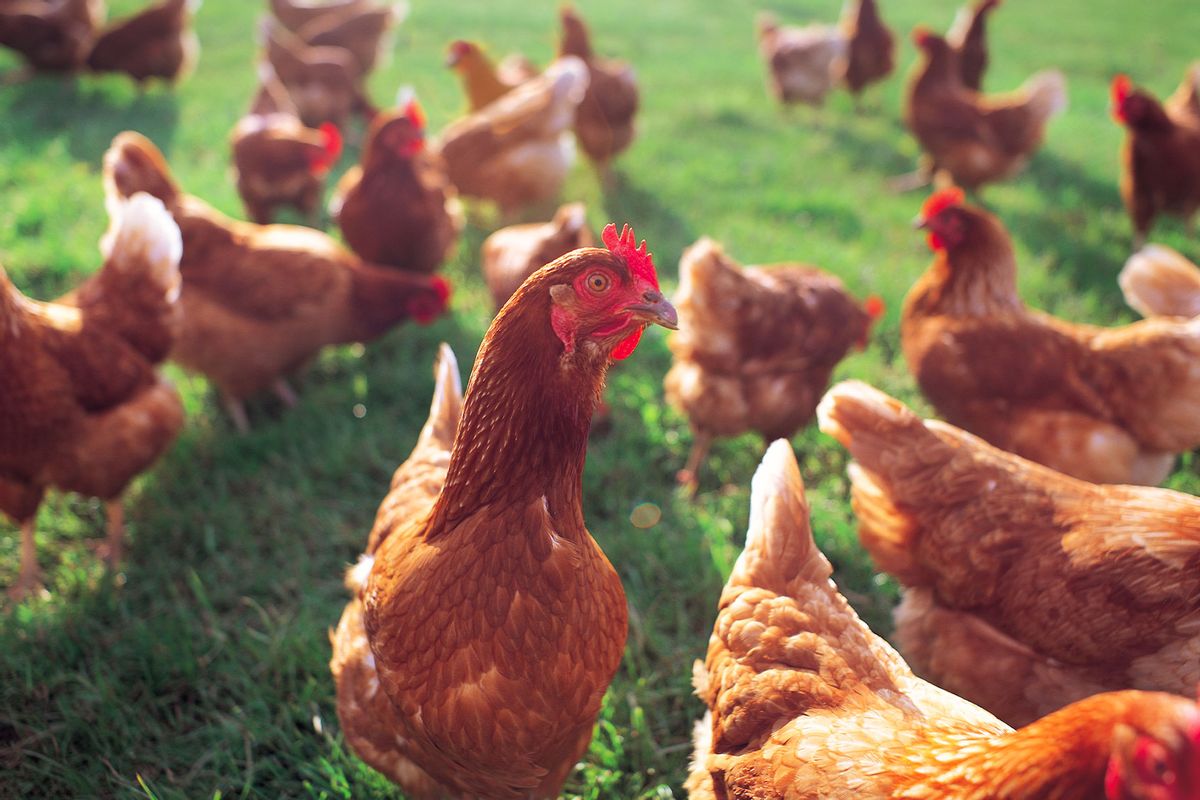If you're thinking of getting backyard chickens, you're not alone. According to surveys from the American Pet Product Association, chicken ownership is on the rise. It increased from 8% of those sampled in 2018 year to 13% in 2020. While some people end up seeing their flock of backyard hens as pets, most people embark on their chicken keeping journey for one reason: eggs.
While eggs from the store usually come in a choice of brown or white, with a backyard flock you can have eggshell colors in blues and greens, chocolate brown, or covered in speckles. They also have the added bonus that, unlike store bought eggs, you know exactly how the hens laying them have been raised. There are plenty of labels on grocery store eggs, but they can be confusing. "Cage-free" hens are better off than those that spend their lives in small battery cages but are still raised in warehouses without ever setting foot outside. The label "free range" might conjure up images of chickens pecking on grass but it's not regulated when it comes to laying hens and at best usually means hens have access to the outdoors, not that the hens use it or that the outside area be inviting to a chicken. Most farmed hens will still be debeaked — a process where the tip of the beak is cut off to prevent them from pecking each other — and killed when they are considered "spent" at just a year or two old. If you want eggs from hens who have lived a good life, raising them yourself may be a better option than deciphering egg labels at the store. You might even find yourself becoming surprisingly fond of your quirky birds.
Eggs brought me on my own backyard chicken journey four years ago but the hens have become much more than that since. They're funny animals who like to constantly chatter away amongst themselves and will happily follow me around the yard on the off-chance that I have a tasty morsel. They have personalities and often make me laugh. As for the eggs, my flock of eight lays far more than my two-person household could ever eat on our own, which means we get to spread the joy of fresh eggs to our friends and community. Chickens are also a wonderful way to get children involved with producing food and a great option for a first pet since chores can easily be scaled up as kids are able to take on more responsibility.
But hens are living animals that require our care to stay healthy. Taking a few important steps before you bring chickens home — whether as full grown hens or chicks — can save you time, heartache and trouble down the line.
Do your research
There are countless books written on the care and keeping of chickens that talk about everything from coop building to chicken husbandry to protecting your garden from your potentially destructive hens. Your local library will likely have a good selection of these and I recommend buying or checking out a couple of them to do some reading before you put in an order for chickens. I do have some personal favorites that I keep in my own collection at home.
"Raising Chickens for Dummies" by Kimberly Willis and Robert T. Ludlow. This series does a wonderful job laying out information in a way that's easy to process (and find again when you need a reference). It has a little bit of everything you need to know about chickens and answers a lot of questions you might not have thought to ask. If you read this book and are still excited about starting a flock, you will be set up for success and your chickens will thank you for it.
"The Chicken Health Handbook" by Gail Damerow. Not everyone has access to a veterinarian who can treat chickens or has the ability to pay for vet visits for their flock. That means you are the first line of defense for keeping your chickens from getting sick in the first place and treating illnesses where you can. Chickens are prey animals which means they often hide when they're feeling poorly. Knowing what signs to look for — drooped wings, strange droppings, issues with laying — and what might be causing it can save you heartache down the line.
In addition to these more instructional books, there are also a lot of fun reads about the world of chickens. While they are a responsibility, hen keeping is also joyful and these books reflect that and can help get family members of all ages excited about chickens. A number of coffee table books have photos of various fancy chicken breeds and "How to Speak Chicken" by Melissa Caughey is full of delightful chicken facts. For younger chicken keepers there are a number of wonderful books like "Mr. Watson's Chickens", written by Jarret Dapier and illustrated by Andrea Tsurumi, or Kelly Jones' middle grade series "Unusual Chickens for the Exceptional Poultry Farmer" where chickens take a starring role in the story.
Protect your flock from predators
Once you've decided you want to give chickens a try, it's time to think about how you're going to house them. Unfortunately humans are not the only ones who want to eat chickens. Depending on predators where you live, you might have to think about proofing your coop against dogs, raccoons, foxes, coyote or even bears. You want a sturdy coop with an attached run so the chickens have access to outside even if you're not planning to let them free range in your yard. The rule of thumb is eight to twelve inches of roosting space per bird in the coop and ideally ten square feet of outdoor space per bird. (More is better here both because it cuts down on cleaning and makes your birds happier — and also because of a little thing called chicken math I'll get to in the next section.)
I've found that most pre-made coops you can buy in stores are not solidly built and often advertise that they can fit far more chickens than you should try to squeeze in. I've had great luck with sites like Craigslist or local chicken Facebook groups (search "chickens" and your state or region to find these) for carpenters who build wonderful, long-lasting coops for only a bit more money. You can also always build your own and there are a lot of great books with plans for DIY coops.
You'll also want to think about rats, which are everywhere and will find your coop eventually. Placing the coop and run on a bed of galvanized wire or digging out a few feet around the coop for an underground wire fence can help keep rodents (and other predators) out. If you have room, there are treadle feeders that are rat resistant you can use in the coop. And always store your feed in a galvanized metal bin because rats can and will chew through plastic. When it comes to keeping these smart rodents away from your flock and feed, the best offense is a good defense.
Choosing your hens
Your coop is ready, you've done your research, now it's time to choose your chickens! This can be the most fun and sometimes overwhelming part of the process. Between size and color variations, there are roughly 450 types of chickens to choose from recognized by the American Poultry Association. The only way to narrow down the choices is to think about your goals for raising hens and where you live. Chickens can tolerate cold better than heat but still need protection from below freezing temperatures. If you live in Arizona, your flock selection should look different from someone's who lives where it's regularly twenty-below-zero. Looking up "cold hardy" or "heat tolerant" breeds can give you some tips here. Those in more temperate climates have more options. I recommend novice chicken keepers look for birds who are known to be on the friendly side and perhaps lay a couple different colors of eggs — because it's fun! There are so many chickens to choose from that many chicken owners end up becoming collectors. This is what leads to a common phenomenon known as "chicken math" where chicken keepers who only intended to have three or six or ten birds quickly wind up with flocks double or triple the size. (This is one reason you should always build a bigger coop than you think you'll need.)
You should also think about whether you'd like to raise your birds from eggs or chicks or get them as older birds. The first two are a great way to get to know your birds better and connect with them but do require a lot more work and equipment. If you're raising chickens in a place where you're not allowed to have a rooster, even getting sexed chicks (chicks whose sex has been identified) isn't a 100% guarantee you won't have an accidental boy in the mix. Which brings me to the next thing to keep in mind.
Make a rehoming plan for your flock
While backyard chickens often come to be considered pets, they occupy a strange middle ground in our lives as birds who are known for being a food animal. In the egg industry, a hen that's a year and a half to two years old is considered "spent" and killed to make room for younger, more reliable layers. While hens don't go through "henopause" until closer to six or seven, they do tend to slow down as they get older. In my family, a hen going from laying five eggs a week to three isn't a problem (and our chickens are pets who will live out their lives with us regardless). If it is for you, you should decide what you'll do with them.
This goes double for roosters. I've talked a lot about hens in this article because if you want eggs, roosters simply aren't necessary. In many cities and suburbs where new chicken keepers live, they're also illegal to keep, because their loud crow can be a nuisance. This has created a real issue for owners who become attached to the chick they raised until the day they hear him crow and realize he can't stay. It's also created a problem for animal shelters and farm animal sanctuaries who are inundated with requests to take in more roosters than they have room for. Many people release these boys to fend for themselves in the wild rather than trying to rehome them or slaughter them. If the roosters aren't eaten by a predator, they're likely to freeze to death when winter comes. Don't do this.
Adopting or buying a pullet (a hen under a year old) or an older hen is a great way around the problem of a potential rooster. The U.K. and some other countries have wonderful programs where they rehome former battery farm hens to household flocks. You can check your local animal shelter, resale groups, or those chicken groups you've already joined on social media to find wonderful hens who just need a new home.




Shares